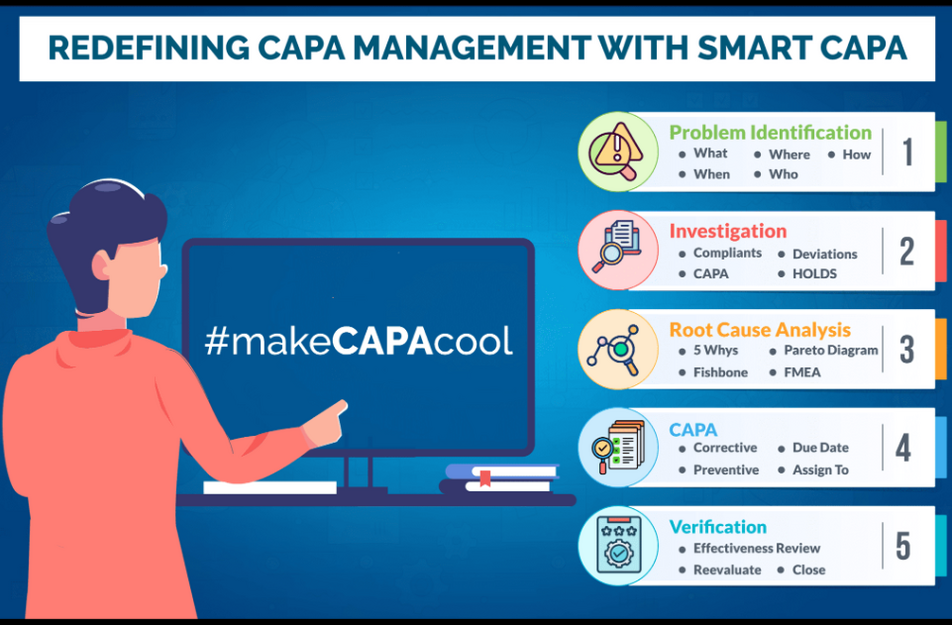
Did you know that the number of FDA-issued Form 483s across all the areas of the regulation rose significantly from 2,430 in FY2021 to 3,838 in FY2022, reflecting a substantial increase of 57.85%, demanding more efficient corrective and preventive actions (CAPA)?
The FDA issues an FDA Form 483 after inspecting a firm, highlighting observed conditions that may violate the Food Drug and Cosmetic FD&C Act and related Acts. The increasing regulatory non-compliances in various industries emphasize the need for a robust and proactive CAPA management strategy. This requires addressing CAPA management shortcomings and revamping the system to establish a “cool” outlook on CAPA to effectively manage issues, deviations, and complaints and prevent their recurrence.
As industry-wide advancement of Corrective and Preventive Action (CAPA) management is required to master its implementation and navigate through regulatory compliance, contemporary CAPA approaches are entering the limelight. A suitable example would be the #makeCAPAcool initiative.
#makeCAPAcool Program: Background
The game-changing #makeCAPAcool initiative formed in 2018 by the Medical Device Innovation Consortium (MDIC) emerged as a response to the prevailing sentiment of dissatisfaction with the current CAPA process within the medical device industry. The CAPA process had become overly compliance-focused, with many manufacturers taking a “one-size-fits-all” approach, employing a standardized strategy that failed to consider varying product and process risk levels and often leading to excessive paperwork.
In response to this situation, the MDIC Case for Quality Collaborative Community (CfQcc) took action by launching the CAPA Process Improvement program, attracting voluntary participation from over 20 medical device organizations associated with MDIC and representatives from consulting firms and the FDA.
#makeCAPAcool Program: Overview
The #makeCAPAcool endeavor sought to augment CAPA effectiveness by maturing established systems and adopting a risk-based CAPA framework tailored to each organization's requirements while still fulfilling regulatory standards. The suggested framework brings about a shift in focus from mere compliance-driven documentation towards the core purpose of CAPA, problem-solving, and improvement to expedite and boost the current CAPA process’s efficiency and user-friendliness, thus making it a “cool” routine for managing non-compliances in the industry.
The proposed framework prioritizes risk assessment as its initial step. It suggests addressing external events and high-risk trends through a stand-alone CAPA record while handling internal events and low-risk trends through a fast-track CAPA path with reduced documentation and simplified effectiveness checks within the QMS.
Risk-Based CAPA Framework
External Events and High-Risk Trends – External CAPA
Internal Events and Lower-Risk Trends – Fast-Track CAPA
The framework consists of three interconnected flows. The first flow deals with external events requiring detailed documentation of the investigation, cause analysis, proposed actions, their impact on the product and QMS, selecting and implementing corrective actions, and verifying their effectiveness. The second and third flows handle internal events, where existing QMS processes can be utilized to address issues internally. The second flow manages internal trends, while the third flow addresses non-trend events. Both paths must meet regulatory requirements proportionate to the risks involved.
New CAPA Framework: Three Flows
External Events and High-Risk Trends – External CAPA
Internal Issues that have become Trend Events – QMS process
Internal Issues that are Non-Trend Events – QMS process
During a two-year pilot program, participating organizations implemented the framework, experiencing accelerated improvements within months (up to 80% reduction in implementation time), and also encountered improvements in the connected QMS processes, such as risk management.
#makeCAPAcool Program: What Should Be Expected?
The new framework, established under the “#makeCAPAcool” initiative, was approved by the FDA and intended to recast CAPA as a risk-based, continuous improvement tool. This new approach aims to shift CAPA from a stagnant space for unresolved problems to a dynamic process that efficiently allocates resources based on issue importance.
By adopting a risk-based strategy, enterprises could eliminate insufficient corrective and preventive action procedures and execute CAPA with minimal burden. The framework acknowledges that not all issues carry the same level of significance, leading to a customized CAPA system that prioritizes and addresses higher-risk or complex issues.
The framework will likely offer a means for effective connection of workflows and QMS elements to focus on critical areas, ensuring pressing concerns receive appropriate attention. By redirecting the CAPA principle towards effectual risk management and tracking and trending issues, companies could set up revitalized CAPA management to deliver optimal results.
Stay ahead of the curve in the CAPA management scenario by incorporating the “Make CAPA Cool” agenda with Smart Food Safe’s Smart CAPA as a transformative digital solution designed for streamlined CAPA management and process automation for any industry.
Complaints, Holds & Deviations
Manage the entire complaint lifecycle, from investigation to resolution, and gain insights for continuous improvement to reduce product holds and deviations by digitizing all the CAPA processes.
Configurable Templates
Create new templates for complaints, deviations, holds, and CAPA, or customize pre-built templates to allow users to choose the information they want on their records.
Record Creation
Generate comprehensive and auditable records using configured templates to capture and track relevant data related to CAPA activities while managing voluminous CAPA records on a centralized platform.
Investigation Management
Gather relevant data and documentary evidence digitally to identify the underlying factors contributing to the quality or compliance issues by conducting structured and thorough investigations.
Root Cause Analysis
Execute root cause analysis by utilizing the integrated systematic RCA models such as 5 Why or FishBone Analysis to determine the cause and develop targeted corrective and preventive action plans.
Non-Compliance Management
Plan, define, and implement non-compliance action items by assigning corrective and preventive actions to respective employees for prompt rectification, maintaining compliance, and mitigating future risks.
Verification of Effectiveness & Closure
Evaluate and validate the performed corrective and preventive actions to review and ensure their efficacy in resolving the nonconformances and successful closure of the CAPA process.
Reporting & Trend Analysis
Generate custom reports and the analysis of data trends to detect, correct, and review outliers in the process for gaining valuable insights to drive informed decision-making for continuous improvement.
_1.png)